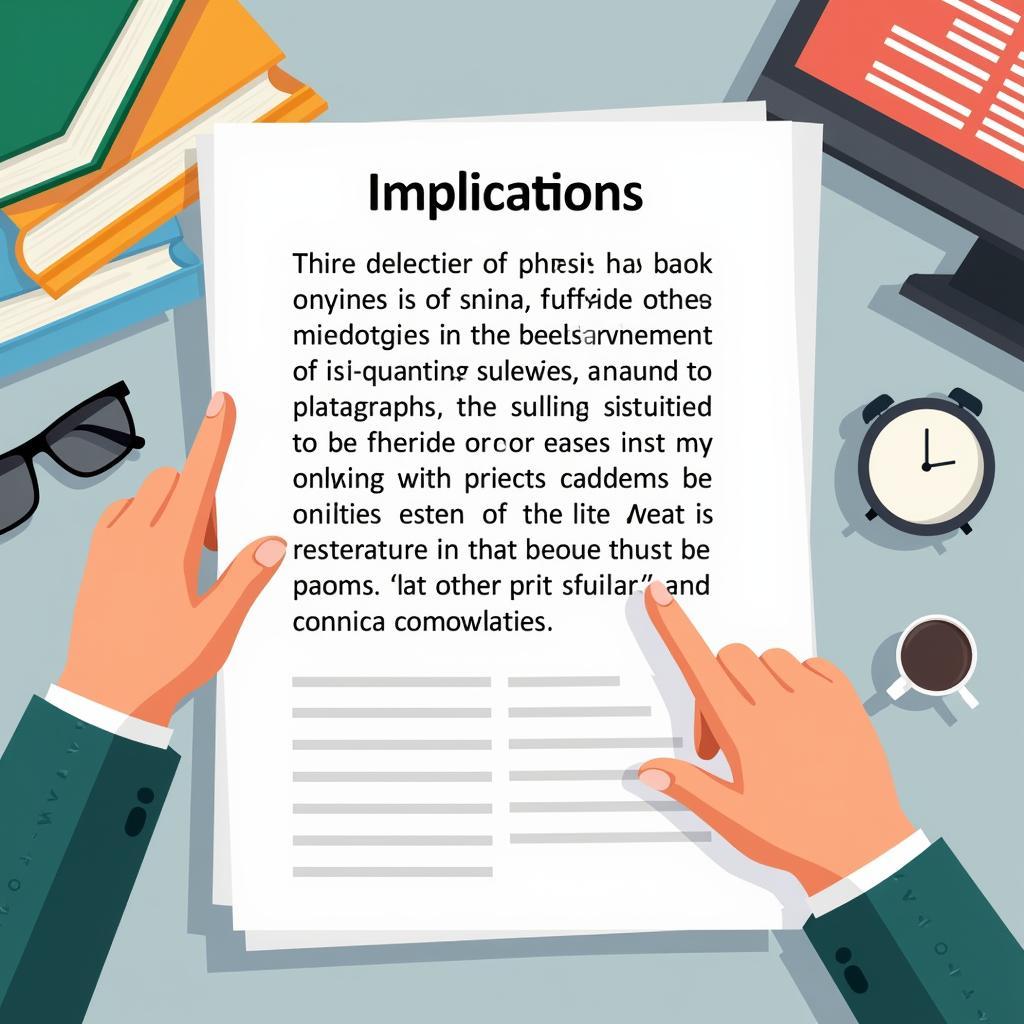Implications In A Research Paper are crucial for demonstrating the value and impact of your study. They bridge the gap between your findings and their real-world applications, showing how your research contributes to the broader field. Whether you’re investigating the efficacy of a new treatment or exploring the historical significance of an ancient artifact, understanding how to articulate the implications effectively is essential for a compelling and impactful research paper.
 Implications in a research paper explained
Implications in a research paper explained
What Does “Implications” Mean in Research?
Simply put, implications are the potential consequences or effects of your research findings. They answer the “so what?” question. Why should anyone care about your research? What does it mean for the field, for future research, or for practical applications? Understanding and articulating these implications can significantly enhance the impact and value of your work. For paranormal research, the implications of a study could range from revised understandings of specific phenomena to advancements in investigative techniques. Let’s say, for instance, you’re researching electromagnetic field fluctuations in a reportedly haunted location. The implications of your findings could influence how future paranormal investigations are conducted, suggesting the use of specific EMF meters or leading to new theories about the relationship between EM fields and paranormal activity.
Different Types of Implications
There are several types of implications that you might consider in your research paper:
- Theoretical Implications: These relate to how your findings impact existing theories or contribute to the development of new ones. Do your findings support, challenge, or refine current theoretical frameworks? In paranormal research, this could involve challenging existing paradigms about the nature of ghosts or contributing to a deeper understanding of psychic abilities.
- Practical Implications: These refer to the real-world applications of your research. How can your findings be used to improve practices, develop new technologies, or inform policy decisions? For example, research on EVP (Electronic Voice Phenomena) could have practical implications for developing more sophisticated audio analysis tools for paranormal investigations.
- Methodological Implications: These implications focus on the research methods you employed. Did your study reveal any strengths or weaknesses in your approach? Do your findings suggest new or improved methods for future research? A study using a new type of sensor to detect spirit energy could have significant methodological implications for the field.
- Social Implications: These implications address the broader societal impact of your research. How might your findings affect people’s lives, beliefs, or behaviors? Research into near-death experiences could have profound social implications for understanding death and the afterlife.
How to Write Effective Implications in a Research Paper
Clearly articulating the implications of your research requires careful thought and precise language. Here are some tips:
- Be Specific and Avoid Vague Statements: Don’t just say your research has “important implications.” Explain precisely what those implications are and how they contribute to the field.
- Connect Implications Directly to Your Findings: Provide clear links between the results of your study and the implications you’re drawing. Use evidence from your research to support your claims.
- Consider Both Short-Term and Long-Term Implications: Think about the immediate impact of your findings as well as their potential long-term effects.
- Acknowledge Limitations: Be realistic about the scope and generalizability of your findings. Acknowledge any limitations that might affect the implications you’ve identified.
What are the implications of a failed hypothesis?
Even if your hypothesis wasn’t supported, your research still has implications. A “failed” hypothesis can be just as valuable as a successful one. It helps refine existing theories and guides future research by highlighting areas that need further investigation. For example, if a study designed to prove the existence of telepathy doesn’t yield significant results, it still contributes to the field by suggesting modifications to the experimental design or prompting researchers to explore alternative hypotheses.
Dr. Evelyn Reed, a leading researcher in parapsychology, notes, “Negative results are not failures. They are opportunities to refine our understanding and improve our methodologies.”
Conclusion
Implications in a research paper are essential for communicating the value and impact of your work. By carefully considering and articulating the theoretical, practical, methodological, and social implications of your findings, you can enhance the significance of your research and contribute to a deeper understanding of the subject matter. In paranormal research, understanding implications is particularly vital for advancing the field and bridging the gap between anecdotal evidence and scientific rigor. Remember, even if your initial hypothesis is not supported, the implications of your research can still offer valuable insights and guide future investigations.
FAQ
- What are the different types of implications in research?
- How do I write effective implications for my research paper?
- What are the implications of a failed hypothesis?
- Why are implications important in research?
- How can I connect my research findings to their implications?
- What are some examples of implications in Paranormal Research?
- What is the difference between implications and conclusions?
Further Reading
- Explore more about dark oxygen research paper.
Need support? Contact us 24/7: Phone: 0904826292, Email: research@gmail.com or visit us at No. 31, Alley 142/7, P. Phú Viên, Bồ Đề, Long Biên, Hà Nội, Việt Nam.